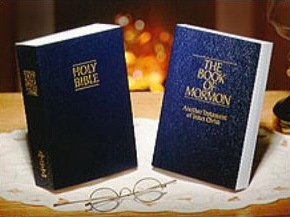Worthy men have always been commanded by God to record their doings, their prophecies, and the Lord’s dealings with them for the edification of all who read and believe. (See Romans 15:4; Revelation 1:11; Malachi 3:16; Psalm 102:16–18.)
 The “stick of Judah” referenced in the Bible is the Bible itself, a record kept by the prophets of Judah. The “stick of Ephraim” holds scripture recorded by the descendants of Joseph (the Book of Mormon). These two scriptural records would come together in one, the one as a second witness to the other that Jesus is the Christ. (See Ezekiel 37:15–16; Hebrews 7:14.)
The “stick of Judah” referenced in the Bible is the Bible itself, a record kept by the prophets of Judah. The “stick of Ephraim” holds scripture recorded by the descendants of Joseph (the Book of Mormon). These two scriptural records would come together in one, the one as a second witness to the other that Jesus is the Christ. (See Ezekiel 37:15–16; Hebrews 7:14.)
The Book of Mormon was written by Israelites dwelling on the American continent. In speaking to the Book of Mormon prophets, the Lord tells them that their record would come forth in the last dispensation of time before His Second Coming, and that it would come from the earth, that it would “hiss forth from the dust.” This matches Isaiah’s prophecy in Isaiah 29:4.
Many non-Mormon scholars argue that the book of Revelation forbids the addition of any scripture to the Bible (Revelation 22:18). This argument is weakened by the likelihood, supported by most biblical scholars, that John wrote the book of Revelation before he wrote his gospel, thus violating his own rule if he intended this rule to apply to the Bible as a whole. It is fatally weakened by the fact the Bible of today did not exist during the lifetime of John.
It is noteworthy also that the book of Deuteronomy contains multiple prohibitions against adding to the words and commandments therein (Deuteronomy 4:2; Deuteronomy 12:32). All of this strongly suggests that these prohibitions apply to the particular book or chapter in which the prohibitions appear, not to the entire canon.
Revelation 22:18:
For I testify unto every man that heareth the words of the prophecy of this book [the Book of Revelation, since there was at that time no Bible], If any man shall add unto these things [“these things” refers to things immediate and specific, not the whole Bible], God shall add unto him the plagues that are written in this book [the Book of Revelation, since there was at that time no Bible and John had yet to write his gospel, which would be an addition].Deuteronomy 4:2:
Ye shall not add unto the word which I command you, neither shall ye diminish ought from it, that ye may keep the commandments of the Lord your God which I command you.Deuteronomy 12:32
What thing soever I command you, observe to do it: thou shalt not add thereto, nor diminish from it.
Is the Bible a Perfect Book?
In the process of compiling the Bible, scholars and clerics rejected many books, including the book of Jubilees, the epistle of Barnabas, the shepherd of Hermas, Paul’s epistle to the Laodiceans, writings attributed to Clement (believed to be a coworker with Peter), and some of the writings of Peter.
There have been many reasons offered for these and other rejections. Prominent among these was the suspicion of forgery or findings by clerics of the time that the writings were inconsistent with other more cherished writings or with well accepted church doctrines or widely held beliefs.
The LDS Church uses the King James Version of the Bible without any revisions or changes. The Church of Jesus Christ has added footnotes and cross references, a Bible Dictionary, Topical Guide, Maps, and Pictures. “On October 15, 1982, the Layman’s National Bible Committee presented an award to The Church of Jesus Christ of Latter-day Saints for outstanding service to the Bible cause through the publication of a new edition (again, not a revision—no content was edited) of the King James Version.”
Mormons revere the Bible equally with the Book of Mormon. They would not have full gospel truth without both. Other canonized scripture in the LDS Church includes the Doctrine and Covenants, a collection of modern revelations; and the Pearl of Great Price, which includes some writings of Abraham and Moses, Joseph Smith‘s story, his translation of parts of the Book of Matthew, and Mormonisms Thirteen Articles of Faith.
Many Christian sects use the Holy Bible as their authority, but they all see different meanings in the book. Verses added hundreds of years after Christ complicate things, and so do missing verses and sections. With an open canon of scripture, understanding is increased. A good example is 1 Corinthians 15, wherein Paul talks about bodies Celestial, Terrestrial, and Telestial. We only get a few verses, and so it’s difficult to come to an agreement as to what these verses mean. However, a wonderful revelation given to Joseph Smith and Sidney Rigdon showed them the three kingdoms of heaven in vision. We learn about the Celestial, Terrestrial, and Telestial kingdoms in detail, thus thoroughly clarifying Paul’s words. (See Doctrine and Covenants, section 76.)
Additional Resources:
